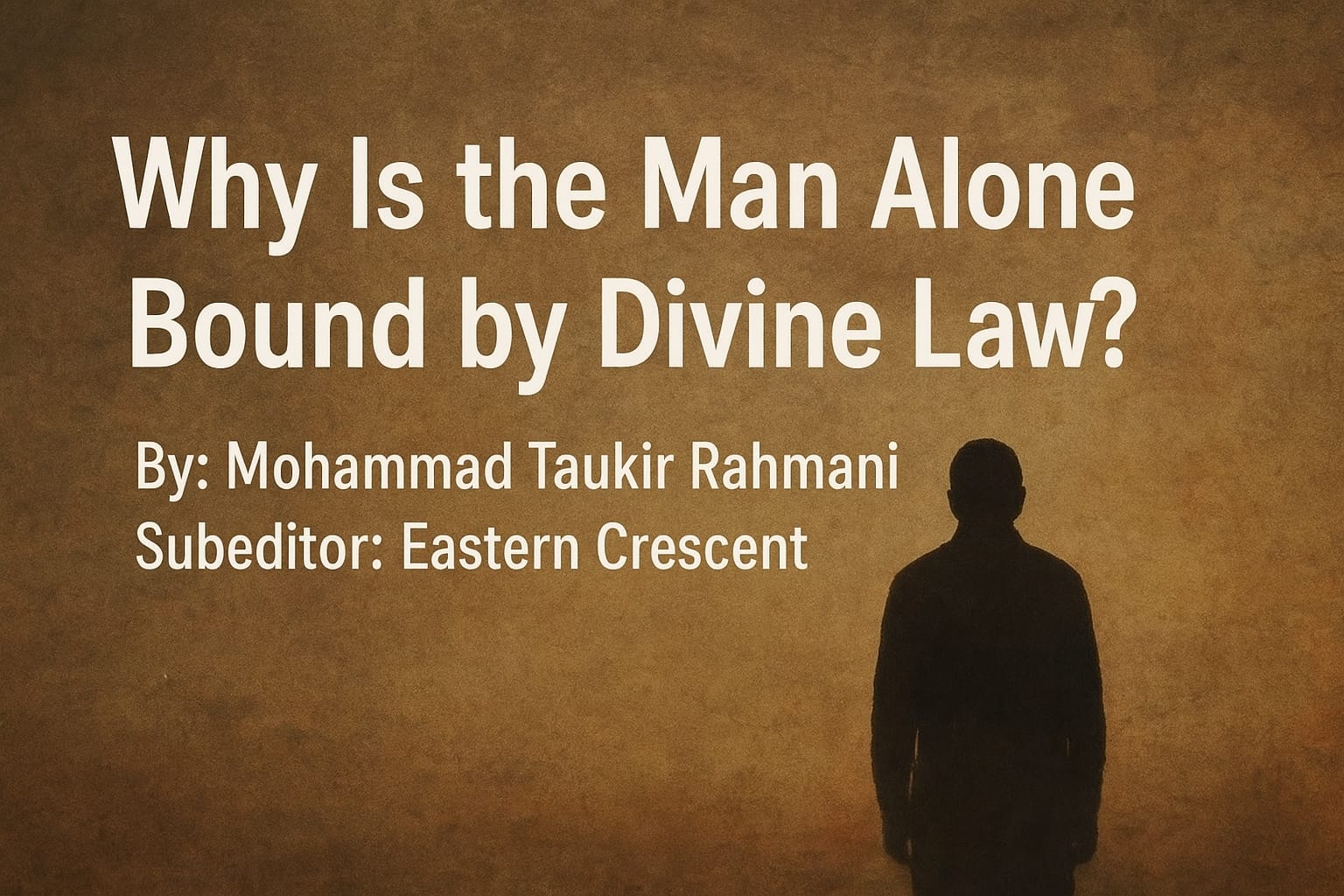
Why Is the Man Alone Bound by Divine Law?
Why Is the Man Alone Bound by Divine Law?
By: Mohammad Taukir Rahmani
EC Exclusive
The universe is not a random scattering of stars, stones, and spaces; it is a vast, open book. Every page of this cosmic book is a testimony to order, wisdom, and purpose. The rising and setting of the sun, the flawless orbit of the earth, the shimmering jewels of night, the stillness of the skies, the perfect balance in every atom—none of these are accidents of chance. They are signposts for the reflective mind, compelling it to admit that behind this cosmos stands an Author—conscious, wise, and infinite in power.
Yet once this truth dawns, a serious question presses itself forward: among countless beings in existence, why is man alone burdened with moral responsibility? Why is he the one addressed by divine law, summoned to accountability, while mountains, seas, animals, and stars remain exempt?
The Gradation of Creation
The answer lies in the degrees of perception and will with which the Creator has endowed His creatures. Broadly, existence falls into three domains: inanimate objects, plants, and animals.
Inanimate entities—stones, mountains, metals—have no sense of perception. They neither choose nor decide; their obedience lies inscribed into their very fabric. They never deviate from the laws imposed on them.
Plants possess a spark of life, but their activity is mechanical and bound. They grow, reproduce, and respond to their environment, but within narrow limits. Rooted to one place, their sustenance is directly provided by soil, sun, and rain.

Animals represent a higher grade. They move freely, sense danger, hunt for food, and guard their young. Their consciousness, however, is tied to instinct. They respond, but they do not rise above response. They survive, but they do not reflect on meaning.
The Distinctiveness of Man
Man, however, is different. He is not merely aware of what is, but also of what ought to be. He possesses self-consciousness, rational insight, and the ability to deliberate between alternatives. Where animals act by compulsion, man acts by choice. Where nature follows necessity, he can pursue ideals.
It is precisely because of this capacity for deliberate choice that he is made answerable. Responsibility is the price of freedom. The Qur’an describes this burden with the term taklīf—the entrusting of duty:
> “God does not burden any soul beyond its capacity.” (Qur’an 2:286)
Elsewhere, this charge is referred to as the Trust (al-amānah):
> “We offered the Trust to the heavens, the earth, and the mountains; they shrank from bearing it, and were afraid of it. But man undertook it—yet he has often been unjust and ignorant.” (Qur’an 33:72)
This verse paints a striking image: the grandest manifestations of creation—sky, earth, mountains—trembled at the weight of this trust. They recoiled, refusing it. But man, daring and audacious, accepted it.
And yet, two words—unjust and ignorant—reveal the peril of this undertaking. Left unguided, man may wrong himself by abandoning justice, or blind himself by living without knowledge. Both dangers collapse him into loss, unless he corrects himself through faith and righteous action—precisely as the Qur’an states in Sūrat al-‘Asr:
> “Indeed, man is in certain loss, except those who believe and perform good deeds.”
Reason Alone: Necessary but Incomplete
One may argue: if man’s reason is so elevated, why can he not simply find his way unaided? Indeed, with pure reason, he might discover that the world has a Creator. But would he know what that Creator desires of him? Would he determine the true purpose of existence, the absolute line between right and wrong, the meaning of justice, purity, and salvation?
Reason, though noble, is finite. It can pose questions that it cannot itself fully answer. Man would have glimpsed the throne but remained ignorant of the decree. For this reason, intellect alone was never sufficient. It required completion.
The Necessity of Revelation and Prophethood
That completion came through revelation and prophethood. Revelation provides the flawless blueprint of life—unaltered, precise, and preserved. Prophethood embodies that blueprint, turning theory into lived practice. The Prophet does not merely recite the law; he walks it, lives it, and thus proves that it can be lived.
Without revelation, man’s search would remain indefinite; without prophethood, divine law would remain an abstraction. Together, they seal the argument against humanity. Nothing remains unseen: the mind points to God, revelation unveils His will, and the Prophet exemplifies it.
Now man cannot say, “The truth was hidden from me.” The proof is complete. The path is shown. What remains is the choice—whether to walk upon it.

The Burden and the Honor
Thus, man’s being the addressee of divine command is not arbitrary. It flows from his very constitution. His freedom to choose summons responsibility. His consciousness of values demands accountability.
This dual gift is both man’s trial and his crown. By it, he may rise beyond the angels or fall below the beasts. In carrying the Trust, he stands at the crossroads of glory and ruin. The honor of being chosen comes hand in hand with the terror of being answerable.
In the end, man’s distinction lies not simply in being able to think, but in being summoned to live by the truth he can recognize. To be bound by divine law is not a restriction, but the very sign that humanity is more than instinct, more than matter—it is a being invited into covenant with the Eternal.
You May Also Like
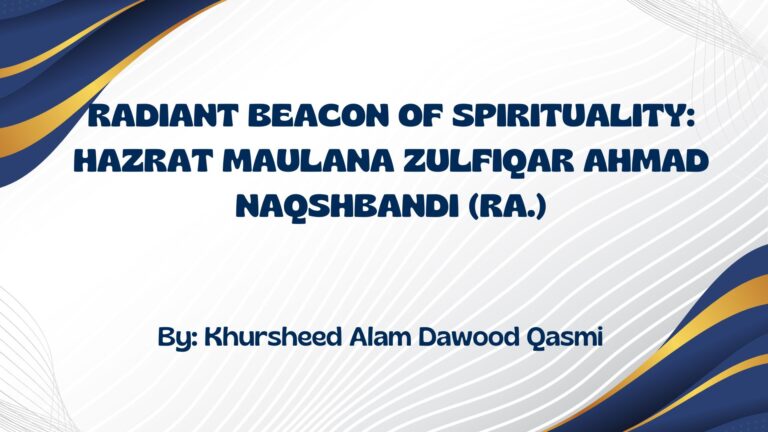 Articles
ArticlesRadiant Beacon of Spirituality: Hazrat Maulana Zulfiqar Ahmad Naqshbandi (Rah.)
By: Khursheed Alam Dawood Qasmi First Acquaintance with Peer Sahib: It was around the...
 Culture
CultureThe Flood of Heresy: A Manifestation of Ideological Colonialism and a Trial for Islamic Consciousness
The Flood of Heresy: A Manifestation of Ideological Colonialism and a Trial for Islamic...
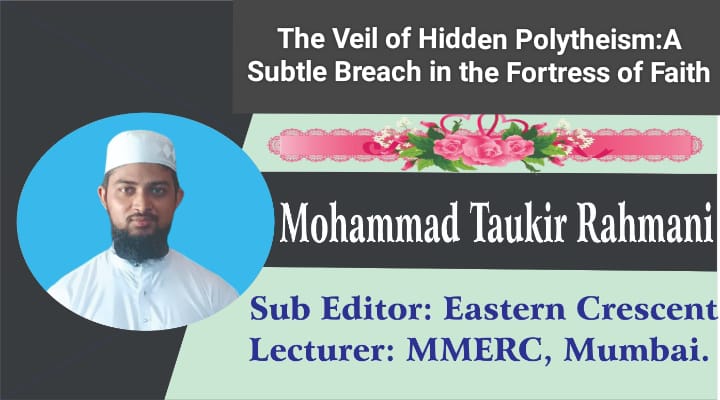 Islam
IslamThe Veil of Hidden Polytheism: A Subtle Breach in the Fortress of Faith
The Veil of Hidden Polytheism: A Subtle Breach in the Fortress of Faith By:...
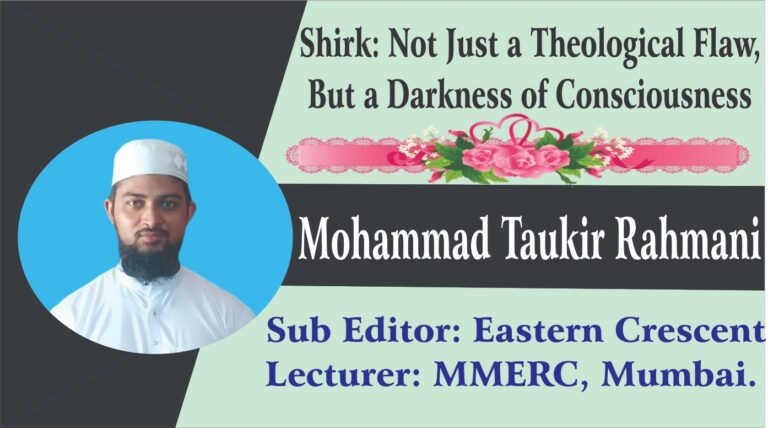 Islam
IslamShirk: Not Just a Theological Flaw, But a Darkness of Consciousness
Shirk: Not Just a Theological Flaw, But a Darkness of Consciousness By: Mohammad Taukir...
 Islam
IslamHuman Creation: Existence for the Sacred Trust of Earthly Vicegerency
Human Creation: Existence for the Sacred Trust of Earthly Vicegerency By: Mohammad Taukir Rahmani...
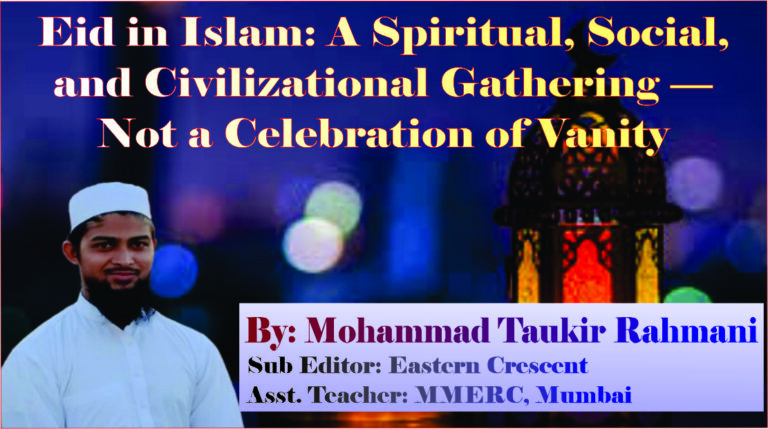 Islam
IslamEid in Islam: A Spiritual, Social, and Civilizational Gathering — Not a Celebration of Vanity
By: Mohammad Taukir Rahmani EC Exclusive Islam is not merely a religion confined to...

Comments (5)
Leave a Comment
Normally I do not read article on blogs however I would like to say that this writeup very forced me to try and do so Your writing style has been amazed me Thanks quite great post
I think this internet site has got very superb written subject matter blog posts.
What i do not realize is in fact how you are now not really a lot more smartly-preferred than you might be now. You're so intelligent. You know thus considerably in the case of this subject, produced me for my part imagine it from numerous varied angles. Its like men and women are not involved unless it is something to do with Woman gaga! Your individual stuffs great. At all times maintain it up!
Wow! Thank you! I permanently needed to write on my blog something like that. Can I take a portion of your post to my blog?
You got a very wonderful website, Gladiola I observed it through yahoo.